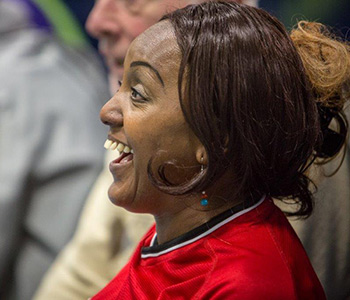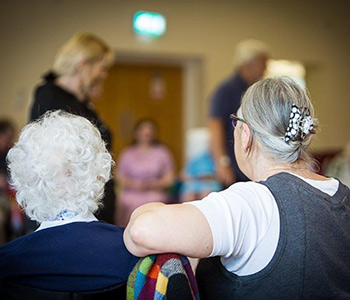The intended audience for this blog is adult children or other relatives caring for their parents. Having attended the Hear and Now preview last night, I’m vividly aware that many of our Tibbs family are happily married/ partnered, in long term relationships – or have been. I am writing today about another group so please bear with me.
I heard an item on Woman’s Hour on Radio 4 recently about caring for a parent who the daughter really doesn’t like. It was not about dementia, but I have been interested in this subject ever since I worked with several families in this situation when I was a social worker.
So, I started, as I usually do, to do an internet search on the subject. I already knew it is a taboo – but I was completely unable to find any scholarly articles and no reports of research projects on the subject. However, I did find some interesting and very frank pieces to read. They were all American and they were on the sites of legal firms specializing in what they call “Eldercare” or care agencies. References <www.wyldementia.org/trauma-informal-dementia-careand www.tnelderlaw.com. www.glassdoor/greentree homecare Chula Vista. I imagine there will be postings on the online carer’s forums run by the large voluntary organisations such as Carers UK and Alzheimer’s Society. But I think it shows us that this is a subject we find hard to talk about.
I discovered years ago, when I first joined the generic team for “Elderly People and Physically Handicapped” in Biggleswade that the System – (NHS and Social Services) is built on two fundamental assumptions. 1. That all families love and care for one another and 2. That women are assumed to be the natural carers for older people. I’ll write about gender another time. The Department, of course, was only offering support to people who met their financial criteria even then. The very large group of families who did not meet that threshold were referred to then, as they still are, as “Self-Funders”. In those days there was not even a Carer’s Assessment to offer. I hope that some good will come from the Covid 19 pandemic when the government finally gets round to investigating it in depth, because it has exposed the weaknesses of the social care system so dramatically.
Anyway. Back to the subject of caring for a person for a person you don’t like. I’m thinking of an abusive parent or a brother who bullied you all your life. Adult children or relatives can suddenly find themselves acting as carers. The role of caring for a person with dementia is never easy – add in years of mistreatment and neglect and you have a truly toxic mix. As a social worker for older people, I came to dread the expression “I promised my wife……. Or I told my dad on his deathbed that I would always look after Mum”. Dreadfully powerful things, those promises. Arguments between siblings in a happily functioning family are very common. Where it is a second marriage and both partners have their own children; with their own strong views about what is best for their parent. The situation can become extremely difficult.
Here are a few suggestions if you find you are in a situation like this – taken from an advice sheet provided by Green Tree Home Care. This, of course, is for those people who feel they have a choice.
1.”You may not be able to pull away from years of parental modeling of love and nurturing. But, as an adult, you live a life of purpose and compassion. You may remember the old wounds and still have scars from mistreatment, but you must act in a way that exemplifies your own moral code…. Don’t feel pressured to accept a role you fundamentally do not want. Caring for a family member you don’t like requires a lot of emotional and physical work. You need to do what is right for your life.”
2. Create boundaries. “As an adult child you are in control of how deep the relationship goes…. you don’t have to fall into old habits…. Be honest about the extent of your involvement. If you feel uncomfortable spending lots of time with your family member, avoid taking on the direct care role. Remember you do not HAVE to do anything. Open a conversation with other family members and service providers. This will help to create healthy expectations.
3. Take care of yourself. “Carer burn out is a reality for anyone and if you don’t want to care for the person it can come faster. Make sure you have emotional outlets that you can connect with……While you may have made peace with the injuries of the past, renewal of intimacy and care may bring back old wounds”.
4. Create a support system. It can take a team of people to care for a person with dementia who needs a lot of care. Other family members may be reluctant to come forward if they shared the same childhood experiences as you. So, build your support from friends, church, clubs and social groups And, of course, groups like Tibbs.
Back in the day I was the social worker for a couple in their late seventies where the wife was trying to use her husband’s dementia as a way to end an unhappy marriage. It took time, patience, skill and teamwork to uncover what was really going on. I heard about a woman of 84 who had only just been referred to us. She had been caring for her husband with dementia for many years with very little help because she always refused what was offered. One day she booked a taxi, took him to A & E and told the nurses that she had had enough and was leaving him there! Which she did. She literally walked away. Clearly, she was utterly desperate because she had been unable to connect with the services which were available. In fact – although she created a drama, she was right in saying that that the legal responsibility for the care of vulnerable people lies with the GP and Social Services. The fact that the “system” chooses to believe that everybody has a loving family to care for them does not change that.
Don’t forget that in Tibbs Dementia we have an invaluable source of support in our three trained counsellors – Sue, Lionel and Petra. They can be contacted via Sarah or Margaret.




